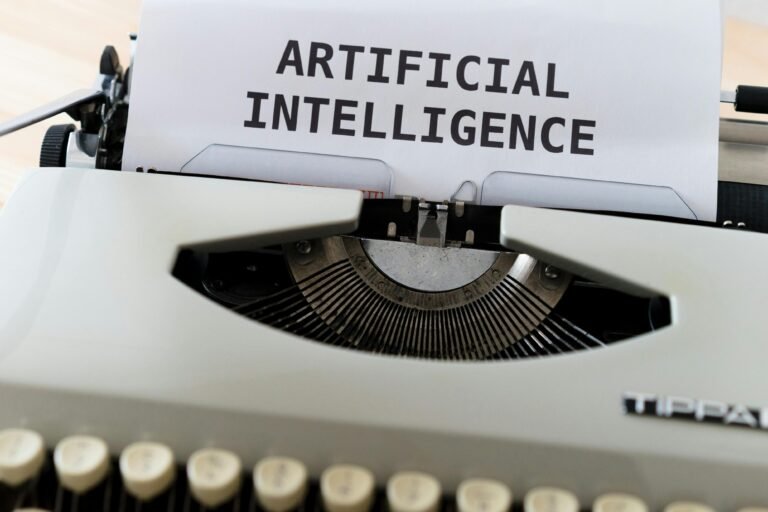Preparing for the Future of Work: Strategies for an AI-Powered Economy

Understanding the AI-Powered Future
The rapid acceleration of artificial intelligence (AI) technologies is profoundly transforming the landscape of work. A convergence of advanced algorithms, machine learning, and automation is reshaping not only industries but also the roles that individuals play within them. As organizations increasingly adopt AI solutions to streamline operations, enhance productivity, and innovate services, it is critical to appreciate the trends that underpin this AI-powered future of work.
Research indicates that AI could augment the productivity of workers by up to 40% by 2035. This statistic underscores the urgency for individuals and organizations to adapt, as the implications for job roles are significant. Certain tasks, especially repetitive or data-intensive ones, are increasingly handled by AI systems, thus shifting the focus towards roles that require emotional intelligence, creativity, and strategic thinking. Consequently, there is a growing demand for skills that complement AI rather than compete against it.
Industries such as finance, healthcare, and manufacturing are witnessing noteworthy transformations due to AI integration. For example, in healthcare, AI algorithms assist in diagnosis and treatment recommendations, enabling healthcare professionals to focus on patient care rather than administrative tasks. In manufacturing, automation technologies optimize production processes, leading to increased efficiency and reduced operational costs. These examples illustrate the dual-edged nature of AI’s impact: while some jobs may be displaced, new opportunities are also emerging in AI-driven sectors.
Furthermore, the World Economic Forum estimates that by 2025, 85 million jobs may be displaced, but 97 million new roles aligned with the changing nature of work will emerge. This dichotomy emphasizes the importance of proactive reskilling and upskilling. As the workforce prepares for this AI-powered future, navigating the evolving job market through continuous learning and adaptation has never been more critical.
Identifying In-Demand Skills for the AI Era
As the economy transitions into a more AI-driven landscape, it is essential to recognize the skills that are becoming increasingly valuable in this new environment. With advancements in artificial intelligence reshaping how businesses operate, certain attributes are emerging as critical for future employees. Among these, critical thinking, creativity, problem-solving, and adaptability stand out as vital competencies.
Critical thinking involves the ability to analyze situations, evaluate options, and make well-informed decisions. In an AI-powered economy, human judgment remains irreplaceable, especially when interpreting data generated by machines. Employers now seek individuals who can assess AI outputs and apply logical reasoning to devise effective solutions. Enhancing critical thinking skills can be achieved through engaging in activities that challenge one’s reasoning abilities, such as participating in debates, taking on complex projects at work, or enrolling in relevant online courses.
Creativity is another indispensable skill in the evolving job market. While AI can assist in automating predefined tasks, human creativity is essential for innovation and developing unique solutions to complex problems. This skill can be nurtured by embracing diverse experiences, seeking inspiration from various fields, and practicing brainstorming techniques. By fostering creativity, individuals position themselves as valuable contributors in an AI-enhanced context.
Problem-solving skills must also be prioritized as they enable professionals to tackle unforeseen challenges effectively. In an environment where AI continuously optimizes processes, employees must demonstrate an ability to navigate new obstacles and devise actionable strategies. Practical exercises, such as simulations or collaborative team projects, can help strengthen one’s problem-solving capabilities.
Lastly, adaptability is crucial for succeeding in a fluid job market increasingly influenced by AI. As technological advancements rapidly transform industries, the ability to adjust to new tools, processes, or workloads will be paramount. Maintaining a continuous learning mindset and seeking opportunities for skill development are effective strategies to enhance adaptability.
In conclusion, identifying and cultivating these in-demand skills is essential for professionals aiming to thrive in an AI-powered economy. By focusing on critical thinking, creativity, problem-solving, and adaptability, individuals can position themselves competitively in the evolving job landscape.
Practical Strategies for Skill Acquisition
As the workforce evolves in response to technological advancements, particularly in artificial intelligence, it becomes crucial to equip oneself with the skills necessary for success in an AI-powered economy. Various educational pathways can be explored to acquire these in-demand skills effectively. Formal education remains a valuable avenue, with universities and colleges offering degrees specifically tailored to emerging fields like data science, machine learning, and AI ethics. Participating in these programs ensures a comprehensive understanding of theory and practice while providing recognition in the job market.
In addition to formal education, workshops and certification programs provide targeted knowledge and practical experience. These short-term courses often focus on specific skills, such as coding languages or project management methodologies, and can be invaluable for professionals looking to upskill rapidly. Organizations like Coursera, Udacity, and LinkedIn Learning offer numerous options for certifications that are recognized within the industry, making them attractive to both individuals and employers.
Self-directed learning resources are also critical in today’s flexible learning environment. Books and podcasts are excellent tools for those wishing to explore new subjects at their own pace. Additionally, numerous online courses are available from platforms like edX and Khan Academy, which allow individuals to delve into topics of interest and acquire new skills from anywhere in the world. This flexibility can encourage a habit of lifelong learning, essential in a world where technology is continuously advancing.
To successfully integrate skill acquisition into daily life, individuals should consider setting aside regular time slots dedicated to learning, whether through online courses or reading. Creating a learning plan with clear goals can help keep motivation high and facilitate personal and professional growth in an ever-changing landscape.
The Importance of Lifelong Learning
As the landscape of the job market transitions due to advancements in technology and the implementation of artificial intelligence, the need for lifelong learning becomes increasingly imperative. Continuous improvement has emerged as a critical element for individuals aiming to maintain a competitive edge in their careers. Lifelong learning can be defined as the ongoing, voluntary, and self-motivated pursuit of knowledge for personal or professional development. In an AI-powered economy, this mindset not only enables workers to adapt to changes but also fosters resilience in the face of evolving industry standards.
Upskilling, or acquiring additional skills to advance one’s career, is essential at various life stages. Early career professionals may seek to enhance their foundational knowledge, while seasoned experts might explore emerging technologies to remain relevant. As job roles rapidly evolve, particularly due to automation and artificial intelligence, embracing a culture of continuous learning allows individuals to pivot and harness new opportunities. Workers equipped with up-to-date skills are better positioned to navigate the complexities of a shifting job landscape.
To cultivate a mindset geared towards lifelong learning, individuals should adopt specific strategies that promote continuous education. Setting clear learning objectives, regularly assessing one’s skills, and engaging in both formal and informal learning experiences can significantly enhance one’s proficiency. Moreover, building a network that encourages knowledge sharing among peers can facilitate the exchange of ideas and foster an environment of collaborative growth. Whether through online courses, workshops, or professional development programs, it is crucial for workers to proactively seek out resources that align with their career goals.
Leveraging Online Learning Platforms
In today’s rapidly evolving job landscape, online learning platforms play a crucial role in equipping individuals with the essential skills required for an AI-powered economy. These platforms offer diverse learning opportunities, catering to a variety of interests and professional demands. They are designed to provide access to knowledge in a flexible format that meets the needs of learners across different stages of their careers.
Popular platforms such as Coursera, Udacity, and LinkedIn Learning offer a range of courses that cover subjects including artificial intelligence, data science, business management, and digital marketing. Each platform features unique offerings, such as interactive quizzes, video lectures, and certificates upon completion, which can enhance a learner’s resume. Additionally, platforms like edX facilitate partnerships with renowned universities, allowing users to access high-quality educational content from prestigious institutions.
Different types of learning experiences, such as traditional courses, hands-on tutorials, and community forums, enhance skill development. For instance, tutorials can provide practical exercises that apply theoretical knowledge, while community forums enable networking and collaborative learning among peers. Such engagement fosters a deeper understanding of complex topics and can lead to valuable professional connections.
When selecting an online learning platform, considerations such as personal learning goals, preferred teaching styles, and the level of support offered are essential. Developing a personalized learning plan that integrates short-term objectives with long-term career aspirations is also advisable. Setting aside time for self-assessment and adapting the learning plan as skill levels grow can enhance the effectiveness of online education.
In conclusion, effectively leveraging online learning platforms is vital for anyone looking to thrive in an AI-driven job market. By choosing the right resources and continuously engaging with new content, individuals can remain competitive and well-prepared for future career opportunities.
The Role of Mentorship in Career Development
In an era characterized by rapid technological advancements and the increasing integration of artificial intelligence in the workplace, the significance of mentorship in career development cannot be overstated. Mentors serve as valuable sources of guidance and support for individuals seeking to navigate their career paths amid evolving job landscapes. Through their wealth of experience, mentors can provide insights into industry trends, recommended career moves, and essential skill sets required in an AI-powered economy.
Mentorship facilitates the sharing of personal experiences and lessons learned, enabling mentees to benefit from the successes and challenges faced by their mentors. By fostering open communication and collaboration, mentorship relationships can enhance the professional growth of both parties. Mentors can help demystify the uncertainties of the future of work, empowering their mentees to make informed decisions regarding education, skill acquisition, and career transitions. Additionally, mentors can introduce mentees to professional networks, opening doors to new opportunities and resources that may otherwise remain inaccessible.
To cultivate effective mentor-mentee relationships, individuals should actively seek out mentors who align with their career aspirations and values. Various strategies can assist in this process, such as attending industry conferences, participating in networking events, or leveraging social media platforms like LinkedIn to connect with potential mentors. Meanwhile, mentoring programs offered by organizations or educational institutions can provide structured environments for building these relationships, ensuring a mutually beneficial experience. Furthermore, establishing clear goals and expectations early on in the mentorship can foster a productive and engaging relationship.
Ultimately, embracing mentorship is vital for preparing for the future of work. By leveraging the insights and experiences gained through mentorship, individuals can better position themselves to adapt successfully to an AI-powered economy.
Building a Human-Centered Approach to AI
The integration of artificial intelligence (AI) into various sectors necessitates a fundamental shift toward a human-centered approach. Ethical considerations must take precedence in the design and deployment of AI systems to ensure that they enhance, rather than impede, human capabilities. As AI technology evolves, it is imperative that developers prioritize the augmentation of human creativity, productivity, and overall well-being. This approach aligns with the broader goal of creating systems that serve humanity and meet the complex, nuanced needs of society.
One significant advantage of AI lies in its ability to handle repetitive tasks, allowing humans to focus on higher-order thinking and innovation. For instance, in fields such as healthcare, AI algorithms can analyze vast amounts of data to assist medical professionals in diagnosing diseases faster and more accurately. This not only elevates the quality of care but also empowers healthcare professionals to devote more time to patient interaction and empathetic support, areas where human intuition and empathy excel.
Moreover, successful examples of human-AI collaboration can be found in various domains. In the creative industries, AI tools are being used to provide inspiration and assist artists in generating new ideas, demonstrating how technology can serve as a partner in the creative process rather than a threat to it. Additionally, in the realm of education, AI-driven platforms can tailor learning experiences to individual student needs, fostering a supportive environment for personal growth and development.
As we advance toward an AI-powered economy, it is crucial for stakeholders, including policymakers, business leaders, and educators, to envision and advocate for a future where AI complements human effort. By emphasizing the importance of a human-centered design in AI development, we can work towards a reality where technology and humans collaborate to enrich lives, drive innovation, and create sustainable progress. This vision challenges every individual to consider their role in fostering a future that values human dignity alongside technological advancement.
Fostering Collaboration between Humans and AI
As we navigate the landscape of an AI-powered economy, it becomes essential for professionals to view artificial intelligence not as a competitor, but as a valuable collaborator. Embracing AI tools has the potential to significantly augment human capabilities, thereby leading to enhanced performance and productivity. The aim is to establish a harmonious collaboration where AI serves as an assistant, improving efficiency and allowing humans to focus on higher-order tasks.
One effective strategy to foster collaboration is through the integration of AI tools into everyday workflows. For instance, professionals in data analysis can utilize AI algorithms to process large datasets more swiftly, enabling them to concentrate on interpreting the findings and deriving meaningful insights. AI can handle repetitive tasks like data entry, allowing employees to dedicate more time to strategic decision-making and creative problem-solving. This change not only increases productivity but can also enhance job satisfaction, as employees engage in tasks that leverage their unique strengths.
Another practical example involves the field of project management. AI-driven platforms can assist in scheduling, resource allocation, and predictive analysis, facilitating smoother project execution. By automating routine administrative tasks, project managers can devote more energy to building team dynamics and fostering innovation. Encouraging regular interactions between teams and AI tools can help demystify the technology, making it more approachable for the workforce.
Moreover, organizations can invest in training programs that equip employees with the skills necessary to seamlessly collaborate with AI technologies. These programs should focus not only on technical competency but also on cultivating a mindset that appreciates the value of AI as a supportive ally. Consequently, as humans and AI work in tandem, organizations can unlock unprecedented levels of creativity and efficiency, ultimately driving progress in the workplace while positioning themselves effectively for the future.
Future Trends and the Evolution of Work
The landscape of work is undergoing significant transformation driven by advances in artificial intelligence (AI). As technology evolves, it not only automates routine tasks but also creates new opportunities within the job market. One of the most notable trends is the emergence of job sectors focused on AI development, data analysis, and cybersecurity. These rapidly growing fields require skills that merge technical know-how with strategic thinking, encouraging workers to pursue continuous education and training. Consequently, professionals in traditional roles must adapt by enhancing their skill sets to remain competitive.
Another significant trend influenced by AI is the potential for remote working. The events of the past few years have accelerated the acceptance of remote and hybrid work models, allowing businesses to tap into a global talent pool. This flexibility not only provides employees with increased autonomy but also helps organizations reduce overhead costs. As companies continue to embrace this model, the future may see a more decentralized workforce, with employees collaborating across various locations, cultures, and time zones.
Furthermore, corporate structures are likely to evolve in response to these shifts. Organizations may lean towards flatter hierarchies that promote agile decision-making, increased collaboration, and innovation. Smaller teams equipped with the right technological tools will be better positioned to respond to the fast-paced nature of an AI-driven economy. Traditional job titles may also become less relevant as roles become more fluid, largely focusing on project-based work rather than fixed positions.
In light of these changes, it is crucial for workers to stay informed and adaptable. Embracing lifelong learning and fostering a growth mindset will empower individuals to navigate the complexities of an AI-driven workforce. By understanding and preparing for these emerging trends, employees can secure their place in the future of work, ensuring they harness the potential of AI and remain valuable assets in their organizations.








